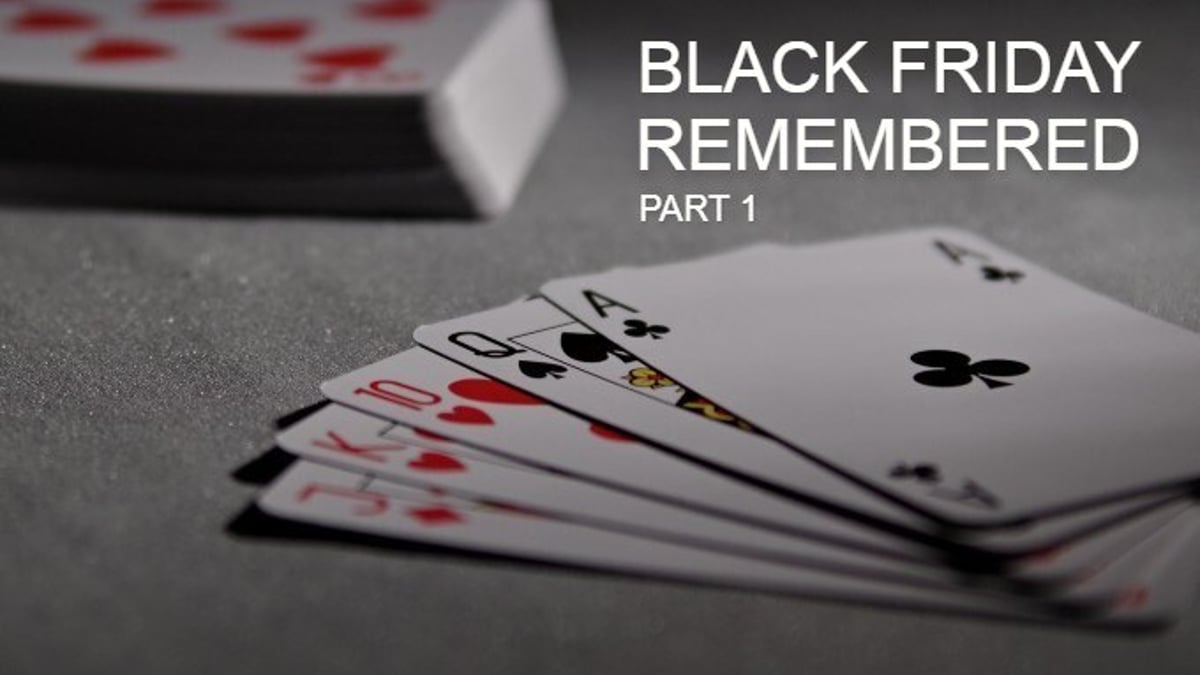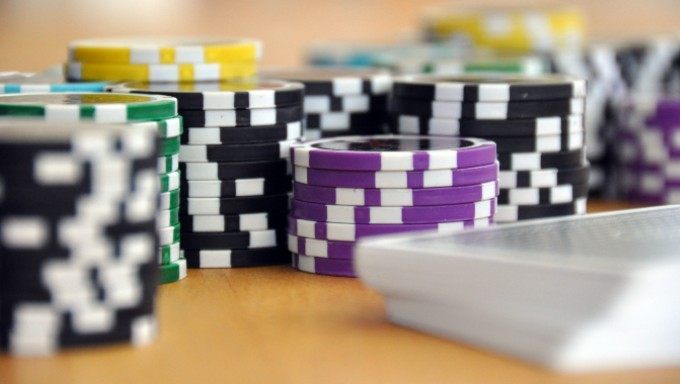Poker Was Flying High at 2006 WSOP; Few Saw Trouble Ahead

April 15 marks the 10-year anniversary of what is known in poker circles as Black Friday. On that day, the U.S. Department of Justice unexpectedly — and suddenly — shut down the major online poker websites. Poker has never recovered. This three-part series chronicles the road to Black Friday and the aftermath.
Part 1: The Big Party
The 2006 World Series of Poker was the Titanic setting sail from Southampton. Or even Pompeii just before Vesuvius.
It was a heady, celebratory spring and summer as the nearly seven-week poker carnival in Las Vegas reveled in its place as the epicenter of America’s infatuation with a game that was on a four-year run of explosive popularity.
Meanwhile, across the country in Washington D.C., political machinations were quietly afoot that eventually would shatter the poker universe.
But in the sunny summer of ’06 at the Rio All-Suite casino-hotel a mile west of the famous Vegas Strip — headquarters for the WSOP — poker players and fans were blithely immersed in the moment.
“It all happened so fast, the poker boom, a lot of us who had been in the game for years we knew that the game had something special about it, otherwise we wouldn't have worked at it,” said Nolan Dalla, who was director of communications for the WSOP back then and who authored the results of hundreds of events plus a best-selling poker book. “But we never expected millions, tens of millions of Americans, and then people all over the world coming from other countries to Las Vegas to play. No one could have foreseen that.”
In 2003, when Tennessee accountant Chris Moneymaker — an amateur player with a Dickensian last name — won the WSOP Main Event and $2.5 million to ignite the poker boom, there were 839 Main Event entrants. In ’06, when Jamie Gold won the No-limit Texas Hold’em championship and $12 million, the field had mushroomed tenfold to 8,773. (That remains the high-water mark although Main Event participation has been getting closer to the ‘06 record over the last 15 years.)
Overall, there were 45 WSOP bracelet events that year.
Online Poker’s Pipeline
The reality is that the swell in participation was directly connected to US online poker sites holding satellite tournaments (basically qualifying events to get into larger events). In that way, online poker had become a pipeline sending players to in-person WSOP events.
In addition to player participation, the 2006 WSOP was characterized by a frenzy of promotional spending by online poker companies who were seizing the moment to court new customers. Ancillary businesses were also at the Rio, piggy-backing on poker’s popularity.
The famous Amazon Room was filled with hundreds of poker tables and thousands of players with spectators standing in line waiting for a chance just to watch. Farther down a wide corridor in the conference wing of the Rio, another giant room featured a bustling trade show.
Vendors showcased equipment for home poker games, poker books, tutorial software, poker-themed clothing, poker-themed wine and poker art. Poker celebrities posed for photos and signed autographs. Showgirls handed out literature and ushered passers-by into online poker hospitality suites. The showmanship reached farcical proportions with one online gambling company featuring pillow fights between scantily clad models in the cavernous tradeshow room.
Nighttime parties during the WSOP featured even more decadent excess. At one celebration in a rooftop cocktail lounge, hostesses strolled among guests offering hors d’oeuvres wearing latex body paint.
Todd Anderson, a TV producer who created the Heartland Poker Tour and Poker Night in America, recalled a birthday party for a poker champion.
“We were at the bowling alley suite or something like that, one of those crazy suites at The Palms, and what I would never forget about it is there was a sushi table and there was a woman, a naked woman, laid out on the sushi table and all the sushi was spread out over on top of her,” Anderson recalled.
Indeed, the poker world was intoxicated on its own sudden success.
“For me it was like, ‘Wow, this is amazing,’ ” said poker chronicler Dalla of the massive player participation and free-flowing money. “And I think my naivety — and a lot of us — was the thought that, ‘Oh, we're here, we made it. It's always going to be like this.’ I don't think a lot of us realized that 2006 would be the high point of popularity.”

Setting the Table for Black Friday
Specifically, what few saw coming was a law that would set in motion the toppling of poker — both online and live — from its lofty perch.
That federal law was the Unlawful Internet Gambling Enforcement Act, or UIGEA (pronounced You-Gee-Ah), which was passed by the U.S Congress late in September 2006 as an add-on to unrelated national security legislation having to do with American seaports just before Congress adjourned. A few weeks later, President George W. Bush signed it into law, setting the table for Black Friday in 2011.
Actually, there had been a warning shot from the Congress in July 2006 as the WSOP was underway when the House of Representatives, in a bipartisan vote, overwhelmingly passed anti-online gambling legislation that foreshadowed UIGEA. But the belief among Congress-watchers in the poker world was that the Senate didn’t have enough time to debate matching legislation, so poker would be safe.
Propelling UIGEA was the NFL and the intended target was offshore sports betting websites during a time when the NFL was staunchly opposed to sports gambling. In hindsight, it was a position fraught with irony now that legal sports wagering is spreading like wildfire and is being eagerly embraced by all the pro sports leagues, including the NFL.
The law that was slipped into national security legislation was designed to cut off the flow of money between average customers and online gambling websites.
“UIGEA was indeed a lightning bolt,” said Yaniv Sherman, a senior vice president with 888, the digital gaming company that now partners with WSOP online poker. “I see UIGEA as a fault line between public and private companies.”
Poker Companies Pull Out of US
Some online gambling companies had recently become publicly traded on the London Exchange. Two prominent ones were PartyPoker and 888 online poker. When Congress put those companies’ business activities in a hazy legal position with the passage of UIGEA, the public firms fled the U.S. market immediately. Meanwhile, private companies, such as PokerStars online poker and Full Tilt, continued to deal to U.S. players and became dominant market leaders by default.
“PartyPoker, which was at that point I think trading higher than British Airways, was a $10 billion company, or $8 billion,” Sherman said.
The difference in the online poker marketplace before and after UIGEA was stark.
“PartyPoker at that point — just on its poker room — had more concurrent players than the entire poker world, or the total addressable market, today combined,” Sherman said.
But that came to a screeching halt for the public companies because of fiduciary duties to shareholders.
'That Was the End of That’
Mark Tenner, a businessman in Las Vegas who arranged and marketed poker cruises, was instrumental in PartyPoker’s growth. His role in online poker in the early days was as an affiliate — essentially someone who steers customers to a gaming website and receives a portion of those players’ action.
According to Tenner, he was making a very good living at it, until UIGEA.
Tenner said he had tens of thousands of players under his affiliate umbrella. Eventually as an affiliate, he was making $160,000 a month and PartyPoker decided it would be a better move to buy him out, he said.
“They could buy (me out) … for nine times the prior 12 months earnings,” Tenner explained.
The buyout was worth about $12 million to Tenner, he said.
He went on: “We had a handshake that at the end of the year (2006), they were going to buy me out. They didn't want to keep paying me; they wanted all the money for themselves.”
Then UIGEA was passed in a surprise move, PartyPoker left the U.S. market, and the value of Tenner’s portfolio of customers crashed. He said he got a call from a marketing executive.
“He called to basically tell me that he wasn’t going to pay me any affiliate money anymore.”
Tenner summed it up: “Anyway, that was the end of that.”
It might have been for Tenner but for the rest of the poker world, it was really the beginning of a years-long road to an even more shocking and impactful end.
Thursday: Part 2, Black Friday










